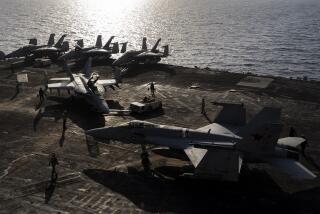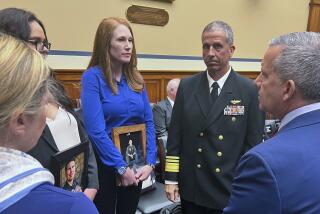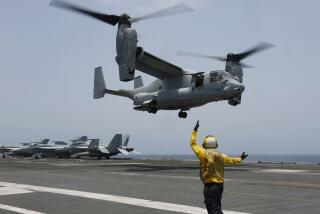Navy Confirms Restrictions on Use of Super Stallion Copters
The Navy on Wednesday confirmed that flight restrictions had been imposed on the troubled CH-53E Super Stallion helicopters as the Navy’s inspector general, Rear Adm. John H. Fetterman, prepared to appear today in Washington before a House Armed Services subcommittee to discuss the controversial aircraft.
In orders sent Tuesday evening, the Marines’ largest cargo and troop helicopters were barred from conducting combat maneuvers, from carrying heavy external loads over populated areas and from carrying passengers--other than the four-person crew--when externally lifting cargo, according to spokesmen for the Navy and Rep. Robert E. Badham (R-Newport Beach).
The restrictions, which went into effect upon receipt, also prohibit vertical landings in unprepared areas where dust and dirt are “kicked up” by the helicopter’s rotor blades.
20 Have Died in Accidents
More than half of the Marines’ 92 CH-53Es, the largest mass-production helicopter in the world, are stationed at the Tustin Marine Corps Air Station. Marine officials there have said that the craft have not been flown since being temporarily grounded on Feb. 14 for inspection and replacement of suspect gearbox assemblies.
The worldwide fleet of 92 Marine helicopters has been involved in a string of fatal accidents, killing at least 20 enlisted men and officers and injuring 17 others.
Before the Navy restrictions were announced, Badham had called on Navy Secretary John F. Lehman to indefinitely ground the helicopters until the military could convince Congress that they were safe to fly. Badham’s request was based on his congressional inquiry, which discovered that the Navy years earlier had been warned about a possible “inherent design deficiency” that produced low-level vibrations.
Badham, who had been a staunch supporter of the Super Stallion, said Tuesday that he does not consider the Navy’s flight restrictions “an adequate response” to his call to ground the craft and that he wanted the Navy’s comments on the problem “on the record.”
More to Read
Sign up for Essential California
The most important California stories and recommendations in your inbox every morning.
You may occasionally receive promotional content from the Los Angeles Times.










